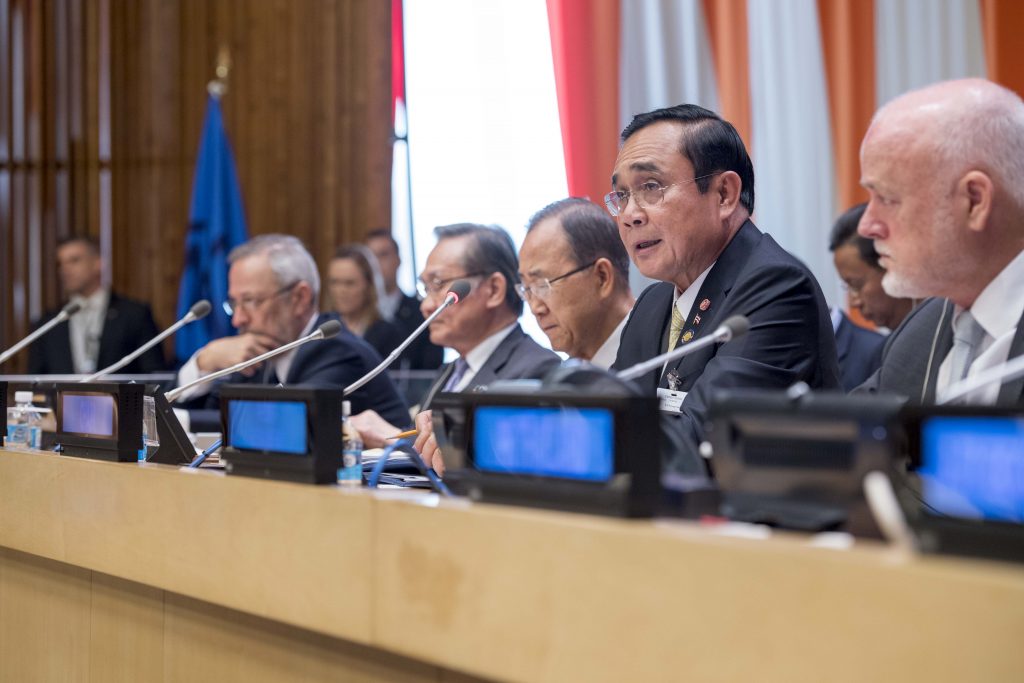Thailand is rising in UN tables showing greater levels of happiness and economic development. Despite this, some foreigners living in Thailand take issue with the UN and its visions of what makes a happy or developed country.
Many foreigners do not exactly agree with the findings of the United Nations which recently in its annual rankings showed Thailand gaining ground in the latest UN-backed world happiness rankings.
Thailand climbed from thirty-third place to thirty second in the latest 2017 report. While the Thai government welcomes this, many foreign expats feel that Thailand is already a better a place to live than many countries that feature in the Top 10.

UN indices are subjective according to one Norwegian expat in Thailand who moved her from Copenhagen
The index measures several national attributes such as gross domestic product per capita, health and life expectancy, freedom, social cohesion, generosity and an absence of corruption. In 2017 Norway was named the world’s happiest country followed by Denmark, Iceland, Switzerland, Finland, Netherlands, Canada, New Zealand, Australia and Sweden. The countries at the bottom of the index included Tanzania, South Sudan, Rwanda, Liberia, Guinea, Togo, Burundi and the Central African Republic.
‘Personally, some of the countries you can see at the top of this UN list to me would represent real nightmare places to live. For me these places are the antithesis of everything I’ve come to love about Thailand since I come to live here,’ says John Solheim, a businessman who has lived in Thailand since 1985. Ironically John, who runs an international publishing business from Thailand is a Norwegian from Trondheim, 500 kilometres from the Norwegian capital Oslo.
Norwegian opted not to live in a ‘happy’ country
John is not impressed that his home country has been listed by the UN as the premier country in the world to live in ranking at Number 1 in the 2017 index.
‘I love my home country, this is not the question, I go back and visit at least one time every year but if I was told I would have to live again in Norway. I think I would be pretty down about it,’ laughs John.
John’s position is all the more remarkable when you take into account another UN index in which Thailand ranks far lower than the 2017 happiness survey.
In the UN’s Human Development Index for 2016 Thailand ranked 87th but it is a country that is showing progress moving up from 88th in the previous year.
This index is more economic and takes into account education, economic output and life expectancy. The rankings in this index released by the United Nations for the year 2015 awarded Thailand a score of 0.726 in what it terms its human development index.
The annual rankings are part of a development programme being run by the United Nations.
Thai concept of development has merit, Europe may not have all the answers to these questions
The goal of the programme and the thought process behind it is one of the key things that John takes issue with. ‘I mean this last year we had this horrible migrant crisis in Europe and we see that there are many problems with the leadership of the world. One of Thailand’s key challenges is the challenge of demographics and this is the result of another programme in the 1970s. I think that in recent years in Thailand there has been some good thinking about what exactly the meaning is of this development including economic development and what is the actual value. I am not saying it is Thailand or Norway or the UN that is right. I am not qualified to say this but I think questions must be asked. I also think the Thai concept of sustainable development which has been put forward by many people also has merit and I think that many people today have similar thoughts and questions about what exactly this UN development is all about.’
Thai governments have traditionally worked with the UN had has made progress at reducing poverty
The UN’s HGI measurement includes such measurements as the gross national income per capita and also key metrics designed to value such concepts as human choice.
The programme sets as a goal the raising of living standards and income as well as the provisions of social safeguards to citizens.
In its report for 2015, the UN notes that 73% of the world population is currently without the sort of social protection that the programme envisages.
The Thai government has traditionally worked closely with the United Nations in the development of programmes and policies. One key achievement in Thailand has been the improvement of life expectancy and increased access for younger people to education. There have also been strong economic gains in Thailand such as a 277.4% increased in per capita gross national income between 1980 and 2014.
In that period the life expectancy of Thai adults has increased by ten years. ‘It is an intriguing fact but Thailand despite the political instability over the last seventy or eighty years with coups and governments going in and out has managed to achieve a remarkable degree of stability as well as economic and social progress.
And we just give some of the credit for this to the efforts of the UN and the partnership that the UN has fostered with successive Thai governments but there is no doubt that since the recent financial crisis and even for some years before that there are many who are beginning to question both the role of the UN and its mission.’, says James Morris an international commentator based in Bangkok.
Danish man gives up Denmark for Thailand
Bernd Jaspersen is a Danish man from Copenhagen who married a Thai woman in 2004. Four years ago in 2014 Bernd and his Thai wife moved to Thailand in the aftermath of the financial crisis in the EU and because the couple felt that they could build a happier more successful life in the country that currently ranks 87th on the UN’s human development list compared to Denmark which comes in at number 5.
‘There were many personal reasons why we decided to live in Thailand. In fact, it was after a holiday that we had in Thailand and when we were in the boarding area at Suvarnabhumi airport to return home, my wife and I felt so depressed that the thought occurred to us to try something new.
I think there have been many changes in Denmark in recent years and the business environment was more and more challenging, I was also not very happy with the way my wife was treated in Denmark.’
Danish man: No comparison, quality of life in Thailand is better having moved her with his wife
Now Bernd runs a successful advertising signage business with his wife as his main partner in Thailand. The business is modestly successful but Bernd says that there is no comparison between the quality of life.
‘I think one of the main reasons is the climate and the weather. That might sound so so simplistic but every day to wake up to the sunshine and also there is less pressure in Thailand.
Yes, it is maybe easier for us because when I was able to sell my property in Copenhagen it left me with some capital and now we are financially more comfortable.
I am fifty-four years of age and it works like this I am not going to be asking too many questions.’ Bernd says that Denmark coming at the top of UN rankings has long been thought of as very successful in terms of economic development and in terms of its progressive social policies.
Tensions have emerged in the perfect Danish society
However, in recent years, Denmark has seen tensions emerge concerning immigration into the country and an anti-immigrant party, the People’s Party has merged as a government kingmaker.
During the course of the migrant crisis in recent months in Europe Denmark surprised many observers last year by introducing draconian legislation to confiscate valuables and wealth from immigrants entering the country seeking asylum and more recently there have been calls among some on the right in Denmark for the country’s participation in the European Union to be put to a referendum.
Danish expat in Thailand sees a downside to Denmark
Bernd understands all this. ‘Ironically I would be a People’s Party supporter even though my wife is Thai, I agree with all provisions that they have called for and when my wife lived in Denmark there was no problem doing all the things the law required because she was proud to do so.
What really is the problem is that there has come to be an elite in the country. For most simple people getting by is a matter of boring money and taxes are too high. Even with my Thai wife working we were unable to keep going when my business began to go down after the crisis in 2008.
It was all too much, too many extensions. Bernd’s comments are supported by the fact that Denmark has the highest level of private debt in the world. Some four times the level Italian citizens for instance.
A high consumption rate of antidepressants
Other research indicates the Danes are number two in the world when it comes to the consumption of antidepressants while the world cancer research has produced research showing that the country has the highest rates of cancer in the world.
‘I can understand this if you are a Dane and live in Copenhagen trying to run a business. One of the things also I do not like about my home country is the superior attitude of the people who are working for the authority or the government. These people have big money and they do not have to worry about any bad day, it is not like this for the ordinary people.’
Join the Thai News forum, follow Thai Examiner on Facebook here
Receive all our stories as they come out on Telegram here
Follow Thai Examiner here
Further reading:
A politically incorrect economic success: Thailand is home to some of the world’s richest people
Bright economic outlook for Thailand but the debt nightmare for poorer Thai people must be tackled
Noble spirit of Thailand’s elderly helps the country deal with the demographic problem


















